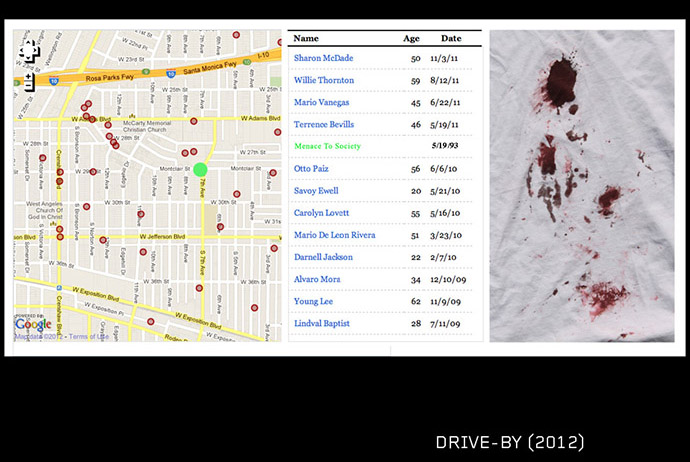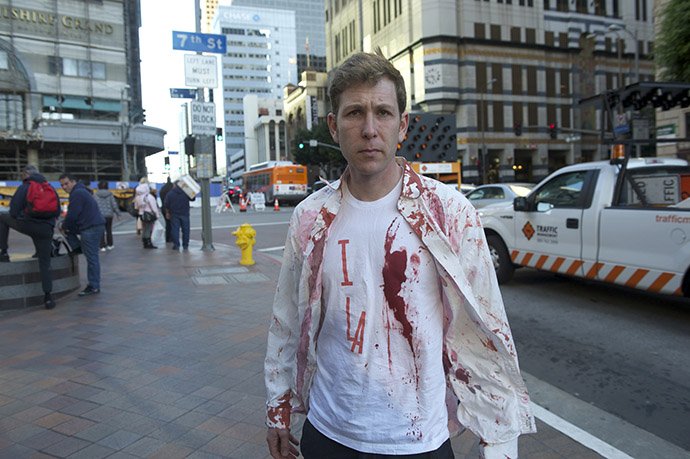

Alex Takacs: David, what are you working on at the moment?
David Leonard: I just finished a PowerPoint. That is how Al Gore made that movie and won a Nobel prize. I am working on a piece that is part Spalding Grey with a touch of Laurie Anderson and some Tony Robbins for good measure. It's a tech demo.
I am also working on my website and it is making me crazy. It is so funny cause it doesn't matter anymore what is on your site, only how it is formatted. How responsive is it to all these different consoles. I like to think of my target as on a 56k modem.
AT: FataLAtour is an app?
DL: Its available on the Android Market as an app and you can book a physical tour, around LA, even the valley. It is an augmented reality tour of Los Angeles, which allows you to re-experience a place where someone was shot and killed in a movie or real life.

AT: In person, you have an uncanny ability to bypass social decorum and not come off as a total weirdo. Your personality tends to erode peoples inhibitions. I feel like this trait comes thorough in some of your work. Is breaking down or exposing social constructs something that interests you?
DL: Yes, I find social constructs absurd. I have a problem with authority. It comes from the same place. I appreciate that you say I am not a total weirdo. [laughs] I do have a feeling that I am walking that line. I like that edge. Some people can get uptight. Especially if they really believe in the truth of their own perception and hold tight to those constructs. My work as a performer can make people very angry if they can't identify how arbitrary our social interactions are.
I worked as a television news camera man. I would carry around all the gear, camera, lights, tripod. So naturally I dressed a little casual. The reporter on the other hand, man or woman, dressed up. I felt like my dress was re-enforcing the expectation that I had less authority than the reporter. So I started dressing in suits. This made some of my reporters upset, like I was moving into their territory. While they say it is a collaborative they very much were the ones who got credit for the material.
When I put on the suit, people couldn't figure out who was in charge. I like that you can make a subtle change and change the perception. It doesn't have to be aggressive. I think that by making a collection of small changes to or in an environment people can take risks and participate in activities they normally may have not have.
AT: You seem to have a dual interest in augmented reality and what I guess you could call the treachery of information—when heterogenous perspectives interpret the same sensory data and come to different conclusions. How do these topics intersect in your work? I could be off base here...
DL: Sensors are recorders. It is important to ask what is being recorded. A magnet is vibrated to a wire that is transmitted into the recording device. So what is listened to isn't even a recording of a voice, it is the recording of a movement of a vibrating magnet. Then that is transcoded into numbers, which are eventually amplified. To think that the same sensory data can have a single experience is madness. Data by nature is bound to be seen through different systems.
AT: How does this Data impact those who experience your project, particularly FataLAtour?
DL: FataLAtour is data driven tour. An event happened in a location, at a particularly point on the z axis of time. In the case of FataLAtour, data points can be either fictional or real, but both can share locations around Los Angeles County.
I guide the tour. And help prepare you with a modified Hollywood blood squib device triggered by a mobile phone. The phone is guided by an app. When the user steps in the location where an on the screen or real shooting death occurred, the phone sends a signal to a pager that sprays theatrical blood on their shirt. The phone then shows the the name, age and circumstances of their death on the phone screen. The homicide data was collected by the Los Angeles Times and UCLA film archive. Certainly this is a closer representation to discuss victims, as opposed to some data visualization.

Alex Takacs is a director who works under the name Young Replicant.
David Leonard is an artist working in Los Angeles. His work is at the intersection of journalism, art, tourism and technology. His web site is DavidLeonard.tv.



 del.icio.us
del.icio.us


